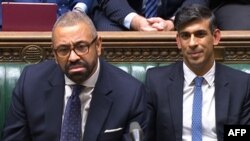Britain published draft emergency legislation on Wednesday that it hopes will allow its Rwandan migrant deportation plan to finally take off by bypassing domestic and international human rights laws that might block it.
The Safety of Rwanda Bill, published the day after Britain signed a new treaty with Rwanda, is designed to overcome a ruling by the United Kingdom Supreme Court that the government's proposed initiative to send thousands of asylum-seekers to the East African country was unlawful.
The government said that the bill was "the toughest immigration legislation ever introduced" and that it would be fast-tracked through parliament. But it suffered a blow when the immigration minister resigned over it.
It shows the divisiveness of the proposals in Prime Minister Rishi Sunak's governing Conservative Party, and it could also trigger further legal challenges.
"Through this new landmark emergency legislation, we will control our borders, deter people taking perilous journeys across the channel and end the continuous legal challenges filling our courts," Sunak said in a statement. He has vowed that flights would begin in the spring next year.
"We will disapply sections of the Human Rights Act from the key parts of the Bill, specifically in the case of Rwanda, to ensure our plan cannot be stopped," he said in the statement.
The bill will instruct judges to ignore some sections of the Human Rights Act and "any other provision or rule of domestic law, and any interpretation of international law by the court or tribunal" that might deem that Rwanda was not a safe country to send asylum- seekers.
Ministers alone would also decide on whether to comply with any injunction from the European Court of Human Rights, which issued an interim order blocking the first planned flight last year.
The Rwanda plan is at the center of Sunak's immigration policy, and its success is likely to be key to the fortunes of his Conservative Party, trailing by about 20 points in opinion polls, before an election expected next year and with the issue one of the biggest concerns among voters.
It was not clear whether the bill will satisfy Sunak's critics on the right of the party who have called for Britain to leave the European Convention on Human Rights altogether. Earlier, former Home Minister Suella Braverman warned that a weak bill would lead to "electoral oblivion."
Interior Minister James Cleverly confirmed that Immigration Minister Robert Jenrick had resigned from government after he was absent from a debate in parliament on the issue.
Meanwhile, conservatives who had warned they might not support a bill that flouts international law welcomed assurances from the government that the measures were legal.
"It is a bill which is lawful. It is fair and it is necessary, because people will only stop coming here illegally when they know that they cannot stay here," Cleverly told parliament.
However, legal commentators said the new legislation would inevitably face challenges in the courts.
"If the government had wished to avoid legal challenges and had also had a high degree of confidence that Rwanda, in fact, is — and will continue to be — a safe place, it seems unlikely that it would have chosen to introduce a bill in this form," said Nick Vineall, chair of the Bar Council.
The government says the Rwanda initiative would deter migrants from paying smugglers to ferry them from Europe across the channel to Britain. Almost 29,000 people have arrived on the southern English coast without permission this year, after a record 45,755 were detected in 2022.
Meanwhile, the cost of housing the 175,000 migrants awaiting an asylum decision is costing $10 million a day.
In its ruling, the Supreme Court said the plan would violate international human rights laws enshrined in domestic legislation because deficiencies in the Rwanda asylum system meant migrants were at risk of being sent back to homelands where they were at risk of abuse.
The government said its new binding treaty, which replaced a memorandum of understanding, together with the new law, will satisfy those concerns.
Rwandan Foreign Minister Vincent Biruta said it was important that the partnership with Britain was lawful.
"Without lawful behavior by the U.K., Rwanda would not be able to continue with the ... partnership," he said.
The opposition Labour Party's home affairs spokesperson Yvette Cooper criticized the government's new law, saying, "The only thing stopping the British government ignoring international law completely is the Rwandan government.
"[Cleverly] has a treaty and a law he knows will not stop dangerous boat crossings,” she said.







